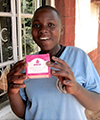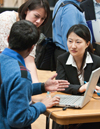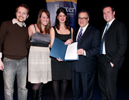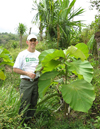GSEC team updates
One of the goals of the Global Social Entrepreneurship Competition was to provide students with training and resources that enable them to launch their social business ideas. We are excited to share these updates about past GSEC participants. These teams continue to make a real impact!
| Social Cops | Soko | Ruby Cup |
 The 2013 ICT Prize winners, are solving real-life problems by harnessing the power of citizen voice. Since their participation in GSEC, Social Cops has been bringing citizens, NGOs and city councils together in India to solve important community issues. Their recent campaign, I Lead Ranchi, was widely successful in raising awareness of the dark, crime-ridden neighborhoods of India. At the end of the campaign more than 2000 streetlights were installed at a cost totaling well over 300,000 USD. Other current campaigns include road safety and improvements and sexual violence. Find out more about these campaigns on their website. The 2013 ICT Prize winners, are solving real-life problems by harnessing the power of citizen voice. Since their participation in GSEC, Social Cops has been bringing citizens, NGOs and city councils together in India to solve important community issues. Their recent campaign, I Lead Ranchi, was widely successful in raising awareness of the dark, crime-ridden neighborhoods of India. At the end of the campaign more than 2000 streetlights were installed at a cost totaling well over 300,000 USD. Other current campaigns include road safety and improvements and sexual violence. Find out more about these campaigns on their website. |
 Soko, formerly known as SasaAfrica, was the ICT Prize winner 2012 and launched an online platform for craftswomen in the developing world to enter the global market. Artisans who lack computers and bank accounts use mobile phone technology to manage their production, sell to shoppers, and get paid directly. Soko promotes fair and ethical trade and brings sustainable fashion to the global marketplace. This new global revenue allows artisans to devote themselves fully to their craft, expand their operations, and develop literacy in mobile technologies and business. Since, 2012 Soko has grown from a successful scaled pilot to a viable business with an international team of 12, accolades and awards from prestigious competitions, and most recently US$700,000 raised from Dubai-based investment firm Rio Partners and other angel investors. Check out their story and exquisite jewelry pieces on the Soko website. Soko, formerly known as SasaAfrica, was the ICT Prize winner 2012 and launched an online platform for craftswomen in the developing world to enter the global market. Artisans who lack computers and bank accounts use mobile phone technology to manage their production, sell to shoppers, and get paid directly. Soko promotes fair and ethical trade and brings sustainable fashion to the global marketplace. This new global revenue allows artisans to devote themselves fully to their craft, expand their operations, and develop literacy in mobile technologies and business. Since, 2012 Soko has grown from a successful scaled pilot to a viable business with an international team of 12, accolades and awards from prestigious competitions, and most recently US$700,000 raised from Dubai-based investment firm Rio Partners and other angel investors. Check out their story and exquisite jewelry pieces on the Soko website. |
 Grand Prize and Investor’s Choice winner 2012, is addressing the issues surrounding the stigma and taboo of menstruation for schoolgirls in Kenya. With each menstrual cup purchased, Ruby Cup gives one to someone who cannot afford menstrual hygiene products. Girls would miss up to 20% of their time in school because of their period, and now they are comfortable and unashamed. The team has started their field work in Kenya and has plans to expand from there. Find out what Ruby Cup means to these girls by reading their letters here. Grand Prize and Investor’s Choice winner 2012, is addressing the issues surrounding the stigma and taboo of menstruation for schoolgirls in Kenya. With each menstrual cup purchased, Ruby Cup gives one to someone who cannot afford menstrual hygiene products. Girls would miss up to 20% of their time in school because of their period, and now they are comfortable and unashamed. The team has started their field work in Kenya and has plans to expand from there. Find out what Ruby Cup means to these girls by reading their letters here. |
| Sanergy | Wello | Nuru Light |
 The 2011 Grand Prize and Rotary Prize of Social Impact winner, is bringing sustainable sanitation to urban slums. Sanergy’s Fresh Life Toilets are designed and manufactured at their local workshop and franchised to a network of Fresh Life Operators. Waste is then collected daily and converted into organic fertilizer and renewable energy and sold back into the market. To date, Sanergy has 307 Fresh Life Toilets, employs 161 Fresh Life Operators, and provides 12,000 daily users with affordable hygienic sanitation. They have even created 350+ jobs which include the Sanergy team, Fresh Life Operators and attendants. Sanergy has been recently chosen as an Ashoka Fellow and are excited to share their work throughout their new network. The 2011 Grand Prize and Rotary Prize of Social Impact winner, is bringing sustainable sanitation to urban slums. Sanergy’s Fresh Life Toilets are designed and manufactured at their local workshop and franchised to a network of Fresh Life Operators. Waste is then collected daily and converted into organic fertilizer and renewable energy and sold back into the market. To date, Sanergy has 307 Fresh Life Toilets, employs 161 Fresh Life Operators, and provides 12,000 daily users with affordable hygienic sanitation. They have even created 350+ jobs which include the Sanergy team, Fresh Life Operators and attendants. Sanergy has been recently chosen as an Ashoka Fellow and are excited to share their work throughout their new network. |
 The 2011 Global Health Prize winner, is delivering cleaner water via an innovative WaterWheel. Greater access to potable water frees up valuable time and keeps children in school and women engaging in more productive activities, therefore breaking the cycle of poverty. Wello has manufactured the WaterWheel 2.0 and tested the design prototype with over 500 people in the villages of Rajasthan. The current prototype meets basic needs but they are looking forward to making even more modifications to improve the user experience. In December 2012, Wello Founder and CEO Cynthia Koenig spoke at TEDxGateway in Mumbai—watch her talk here. The 2011 Global Health Prize winner, is delivering cleaner water via an innovative WaterWheel. Greater access to potable water frees up valuable time and keeps children in school and women engaging in more productive activities, therefore breaking the cycle of poverty. Wello has manufactured the WaterWheel 2.0 and tested the design prototype with over 500 people in the villages of Rajasthan. The current prototype meets basic needs but they are looking forward to making even more modifications to improve the user experience. In December 2012, Wello Founder and CEO Cynthia Koenig spoke at TEDxGateway in Mumbai—watch her talk here. |
 The 2010 Grand Prize Winner, is working to raise capital and using GSEC prize money to help expand operations in the Rwandan countryside. On the product side, they are redesigning the light so that it is 3.5 times brighter and have begun rolling out cell phone chargers. They currently have almost 10,000 lights sold (~50,000 users) and 70 recharging stations. They will begin scaling up rapidly at the start of next year throughout Rwanda and East Africa. Check out their website. The 2010 Grand Prize Winner, is working to raise capital and using GSEC prize money to help expand operations in the Rwandan countryside. On the product side, they are redesigning the light so that it is 3.5 times brighter and have begun rolling out cell phone chargers. They currently have almost 10,000 lights sold (~50,000 users) and 70 recharging stations. They will begin scaling up rapidly at the start of next year throughout Rwanda and East Africa. Check out their website. |
| ToucHB | Lumana | Planting Empowerment |
 The Global Health Winner, received a boost after participating in GSEC. “We have partnered with PATH assess and launch ToucHb in developing areas of the world. We also co-applied with PATH for an exploratory grant from the Bill and Melinda Gates Foundation. While the development is taking place in Mumbai, an independent assessment is envisioned to take place in Seattle. A prototype of ToucHb was given to PATH for the same. Needless to say, our participation at GSEC opened doors beyond our expectation.” The Global Health Winner, received a boost after participating in GSEC. “We have partnered with PATH assess and launch ToucHb in developing areas of the world. We also co-applied with PATH for an exploratory grant from the Bill and Melinda Gates Foundation. While the development is taking place in Mumbai, an independent assessment is envisioned to take place in Seattle. A prototype of ToucHb was given to PATH for the same. Needless to say, our participation at GSEC opened doors beyond our expectation.” |
 This 2009 Finalist Team has evolved into the present day microcredit NGO Lumana based in Ghana. With a mission of alleviating poverty in rural communities through education and entrepreneurship, the organization’s operations have grown from a small project as part of a local Development Foundation to a full-fledged independent organization. Lumana has solidified relationships with 33 cooperatives, serves 13 villages, provided $292,000 in loans and employs 9 African staff members. Learn more, and be sure to check out the article about Lumana in The Atlantic. This 2009 Finalist Team has evolved into the present day microcredit NGO Lumana based in Ghana. With a mission of alleviating poverty in rural communities through education and entrepreneurship, the organization’s operations have grown from a small project as part of a local Development Foundation to a full-fledged independent organization. Lumana has solidified relationships with 33 cooperatives, serves 13 villages, provided $292,000 in loans and employs 9 African staff members. Learn more, and be sure to check out the article about Lumana in The Atlantic. |
 The GSEC 2007 Finalist Team, grew from the belief that there exists a better way for Panamanian peasant farmers and indigenous communities to maximize the economic benefit from their natural resources. To this end, PE offers socially and environmentally minded investors growth opportunities in sustainably managed timber plantations that benefit these people. PE maintains 50 acres of timber plantations that include over six species of commercially valuable trees. In 2009, it was selected as a SEED Award winner, a program of the United Nations. The GSEC 2007 Finalist Team, grew from the belief that there exists a better way for Panamanian peasant farmers and indigenous communities to maximize the economic benefit from their natural resources. To this end, PE offers socially and environmentally minded investors growth opportunities in sustainably managed timber plantations that benefit these people. PE maintains 50 acres of timber plantations that include over six species of commercially valuable trees. In 2009, it was selected as a SEED Award winner, a program of the United Nations. |
